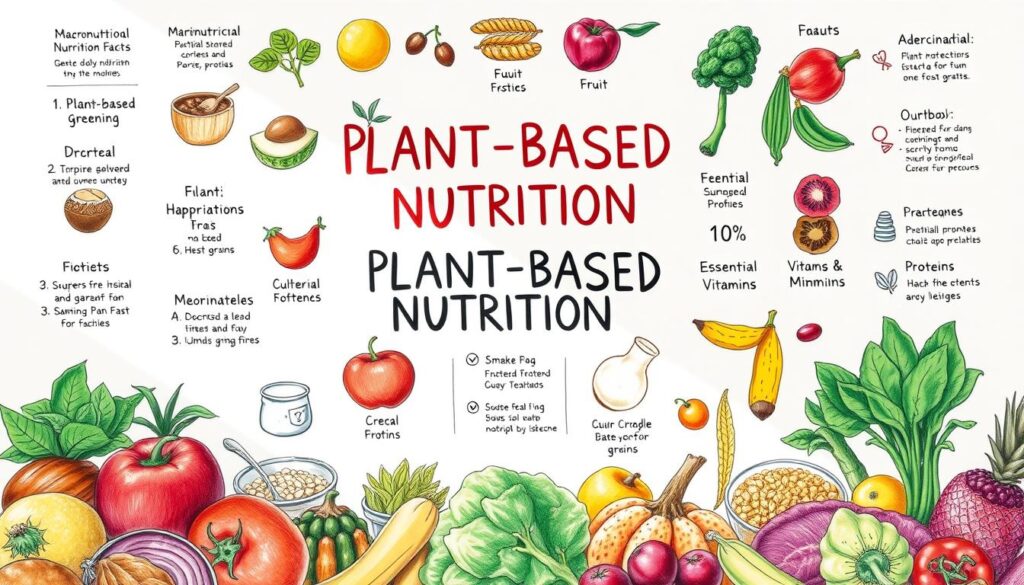Can a diet rich in plants really transform your health? As more people turn to plant-based diets, understanding the underlying nutrition science becomes increasingly important.
The shift towards plant-based nutrition is driven by its potential health benefits and environmental impact. But what exactly does it mean to follow a plant-based diet, and how can it affect your well-being?
Embracing a plant-based diet involves more than just avoiding animal products; it’s about understanding the intricate balance of nutrients and how they support overall health.
Key Takeaways
Table of Contents
- Plant-based diets are gaining popularity for their health and environmental benefits.
- Understanding the science behind plant-based nutrition is crucial for maximizing its benefits.
- A well-planned plant-based diet can provide all necessary nutrients for good health.
- The shift to plant-based eating involves considering the nutritional balance and environmental impact.
- Embracing plant-based nutrition can lead to significant health improvements.
The Science Behind Plant-Based Nutrition: Core Principles
Understanding the core principles of plant-based nutrition is essential for adopting a diet that is both nourishing and sustainable. At its core, plant-based eating involves a variety of dietary patterns that emphasize foods derived from plants.
Defining Plant-Based Eating Patterns
Plant-based eating patterns are characterized by a high intake of fruits, vegetables, whole grains, and legumes. These dietary patterns can vary widely, from vegetarian to vegan diets, each with its own set of guidelines and nutritional considerations.
Macronutrient and Micronutrient Profiles
A well-planned plant-based diet provides all the necessary macronutrients and micronutrients for optimal health. This includes a balance of protein, healthy fats, and complex carbohydrates, along with essential vitamins and minerals.
For instance, plant-based nutrition research highlights the importance of vitamin B12, iron, and omega-3 fatty acids, which are commonly found in lower levels in plant-based foods compared to animal products.
Phytonutrients and Bioactive Compounds
Phytonutrients and bioactive compounds are abundant in plant-based foods and play a crucial role in maintaining health and preventing disease. These compounds have been shown to have antioxidant, anti-inflammatory, and immune-modulating effects.
By incorporating a variety of plant-based eating patterns, individuals can maximize their intake of these beneficial compounds, supporting overall health and well-being.
Evidence-Based Health Benefits of Plant-Based Diets
A growing body of evidence underscores the significant health advantages of embracing a plant-based dietary pattern. This evidence is multifaceted, covering various aspects of health and disease prevention.
Cardiovascular Health and Blood Pressure Regulation
Plant-based diets are rich in fruits, vegetables, and whole grains, which are known to contribute to cardiovascular health. These foods are high in fiber, vitamins, and minerals that help in regulating blood pressure and reducing the risk of heart disease. Studies have shown that individuals following a plant-based diet tend to have lower blood pressure levels and a reduced risk of cardiovascular mortality.
Weight Management and Metabolic Health
Plant-based diets are often associated with effective weight management. The high fiber content in plant-based foods helps in satiety, reducing the likelihood of overeating. Moreover, plant-based diets tend to be lower in saturated fats and higher in nutrients, contributing to better metabolic health. Research indicates that plant-based dietary patterns can lead to significant weight loss and improvements in metabolic syndrome parameters.
Inflammation Reduction and Disease Prevention
A key benefit of plant-based diets is their ability to reduce inflammation, a major risk factor for chronic diseases. Plant-based foods are rich in antioxidants and phytonutrients that help in mitigating oxidative stress and inflammation. This reduction in inflammation can lead to a lower risk of various diseases, including cardiovascular disease, type 2 diabetes, and certain cancers.
Cancer Risk Reduction
The role of plant-based diets in cancer prevention is an area of significant interest. Diets rich in fruits, vegetables, and whole grains have been associated with a reduced risk of certain cancers. The antioxidants and phytonutrients in these foods help in protecting cells from damage and reducing the risk of tumor formation.
Diabetes Management
Plant-based diets have been shown to be beneficial in diabetes management. The high fiber content and low glycemic index of plant-based foods help in regulating blood sugar levels. Studies have demonstrated that plant-based dietary patterns can improve insulin sensitivity and glycemic control, reducing the risk of complications in individuals with diabetes.
How to Transition to a Plant-Based Diet Successfully
Successfully moving to a plant-based diet involves understanding and implementing several important steps. This transition can be made smoother by incorporating familiar meals, using a balanced nutrition method, and addressing nutritional needs.
Step 1: Start with Familiar Plant-Based Meals
Begin by introducing plant-based versions of your favorite dishes. This could mean substituting meat with plant-based protein sources like beans, lentils, or tofu in traditional recipes. For example, making a plant-based version of spaghetti Bolognese using lentils or mushrooms can make the transition more enjoyable and less daunting.
Step 2: Implement the Plate Method for Balanced Nutrition
The plate method is a simple way to ensure you’re getting a balanced mix of nutrients. Divide your plate into sections: half for vegetables, a quarter for whole grains, and a quarter for protein sources. This visual guide helps in maintaining a balanced diet and ensures you’re getting a variety of nutrients.
Step 3: Address Nutritional Considerations
When adopting a plant-based diet, it’s crucial to pay attention to certain nutrients that are commonly found in lower levels in plant-based foods.
Protein Optimization Strategies
To meet your protein needs, include a variety of plant-based protein sources such as legumes, nuts, seeds, and whole grains in your diet. Combining different protein sources can help ensure you’re getting all essential amino acids.
Essential Nutrients to Monitor
Pay special attention to nutrients like vitamin B12, iron, and omega-3 fatty acids, which are typically found in lower levels in plant-based diets. Consider supplements or fortified foods to meet your needs.
Step 4: Track Your Progress and Adjust
Keep a food diary or use an app to track your eating habits and how you’re feeling. This can help identify any nutritional gaps or areas for improvement, allowing you to make adjustments as needed to maintain a healthy and balanced plant-based diet.
Practical Strategies for Plant-Based Nutrition Success
Succeeding in plant-based nutrition involves strategic meal planning, savvy shopping, and navigating social eating with confidence. By mastering these elements, individuals can ensure a smooth transition to a plant-based lifestyle.
Meal Planning and Batch Cooking Techniques
Effective meal planning is the cornerstone of a successful plant-based diet. It involves creating a weekly meal plan, making a grocery list, and batch cooking. Batch cooking not only saves time but also ensures that healthy meals are always available. Consider preparing large batches of grains, legumes, and roasted vegetables that can be used throughout the week.
To get started with meal planning, identify your nutritional needs, plan your meals around seasonal produce, and use a variety of cuisines for inspiration. Utilize meal planning apps or websites that offer plant-based recipes and meal ideas.
Shopping Guide for Plant-Based Staples
A well-stocked pantry is essential for maintaining a plant-based diet. Key staples include whole grains like quinoa and brown rice, canned beans, nuts, seeds, and a variety of spices. When shopping, focus on purchasing fresh, local produce and consider buying in bulk to reduce waste and save money.
| Plant-Based Staple | Nutritional Benefits |
|---|---|
| Quinoa | Complete protein, rich in iron and fiber |
| Canned Beans | High in protein, fiber, and various vitamins and minerals |
| Nuts and Seeds | Rich in healthy fats, protein, and antioxidants |
Navigating Social Situations and Dining Out
Dining out or attending social gatherings can be challenging on a plant-based diet, but with some preparation, it’s manageable. When eating out, look for restaurants that offer plant-based options and don’t hesitate to ask for modifications to suit your dietary needs.
Restaurant Ordering Tips
When ordering, choose dishes that are centered around vegetables, legumes, and whole grains. Be specific about your dietary preferences and ask for no animal products. Many restaurants are now accommodating to plant-based diets, so don’t be afraid to ask questions.
Handling Social Pressure
Social pressure can be a significant challenge when adopting a plant-based lifestyle. It’s helpful to communicate your dietary choices clearly and politely. Offering to bring a plant-based dish to share can also help others understand your choices and may even inspire them to try something new.

Conclusion: Integrating Plant-Based Nutrition into Your Lifestyle
Embracing a plant-based lifestyle can be a transformative journey, backed by the science behind plant-based nutrition. By understanding the core principles and evidence-based benefits, individuals can make informed choices to improve their overall health and wellbeing.
The benefits of plant-based nutrition are multifaceted, ranging from cardiovascular health and weight management to inflammation reduction and disease prevention. As discussed, a well-planned plant-based diet provides essential macronutrients and micronutrients, along with phytonutrients and bioactive compounds that support optimal health.
To successfully integrate plant-based nutrition into your lifestyle, start by incorporating familiar plant-based meals, implementing the plate method, and addressing nutritional considerations. With practical strategies like meal planning, batch cooking, and navigating social situations, you can maintain a balanced and satisfying plant-based diet.
By adopting a plant-based lifestyle, you can experience the numerous plant-based nutrition benefits, from improved health outcomes to a reduced environmental footprint. As you continue on this journey, remember that every step counts, and small changes can add up to make a significant difference in your overall wellbeing.
FAQ
What is plant-based nutrition, and how does it differ from other diets?
Plant-based nutrition focuses on consuming foods derived from plants, including fruits, vegetables, whole grains, and legumes, while minimizing or avoiding animal products. This approach differs from other diets in its emphasis on whole, minimally processed foods and its potential to provide numerous health benefits.
What are the key components of a well-planned plant-based diet?
A well-planned plant-based diet includes a variety of foods such as fruits, vegetables, whole grains, legumes, nuts, and seeds. It is essential to pay attention to the intake of critical nutrients like vitamin B12, iron, zinc, and omega-3 fatty acids, which are found in lower levels in plant-based foods.
How does a plant-based diet impact cardiovascular health?
A plant-based diet has been shown to support cardiovascular health by reducing the risk of heart disease, lowering blood pressure, and improving overall lipid profiles. This is attributed to the high levels of fiber, antioxidants, and phytochemicals present in plant-based foods.
Can a plant-based diet provide adequate protein?
Yes, a plant-based diet can provide adequate protein if planned properly. Legumes, beans, lentils, tofu, tempeh, and seitan are excellent sources of protein. Additionally, nuts, seeds, and whole grains contribute to the overall protein intake.
What are some common challenges when transitioning to a plant-based diet, and how can they be overcome?
Common challenges include ensuring adequate nutrition, managing social situations, and dealing with cravings for familiar foods. These challenges can be overcome by meal planning, seeking support from like-minded communities, and gradually introducing new plant-based foods into the diet.
How can I ensure I’m getting all the necessary nutrients on a plant-based diet?
To ensure you’re getting all the necessary nutrients, focus on consuming a variety of whole, minimally processed foods. Consider consulting with a registered dietitian or healthcare professional for personalized guidance, and be mindful of your intake of critical nutrients like vitamin B12 and omega-3 fatty acids.
Are there any specific plant-based foods that offer additional health benefits?
Yes, certain plant-based foods are rich in phytonutrients and bioactive compounds that offer additional health benefits. Examples include berries for their antioxidant properties, leafy greens for their vitamin and mineral content, and cruciferous vegetables for their potential anti-inflammatory effects.
How can I maintain a balanced and satisfying plant-based diet when eating out or in social situations?
When eating out or in social situations, look for plant-based options, ask questions about ingredients, and don’t be afraid to request modifications. Planning ahead, bringing plant-based dishes to share, and communicating your dietary preferences can also help.

